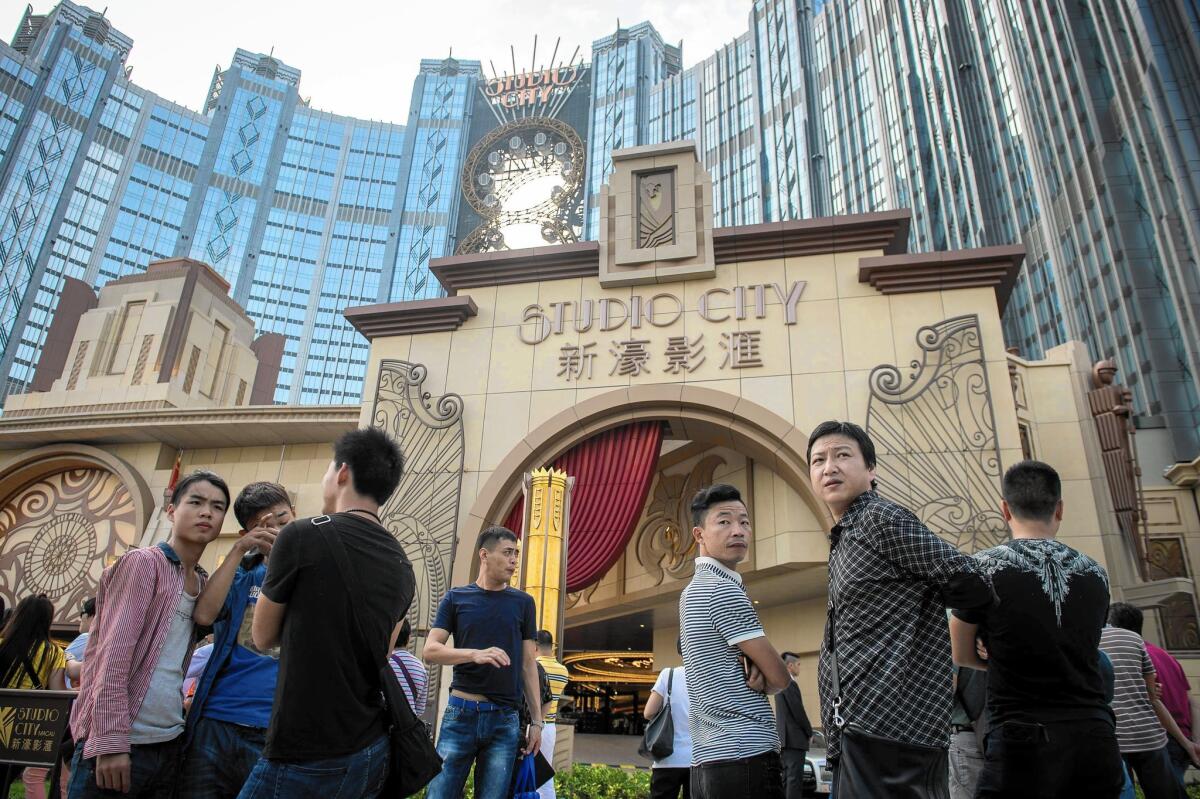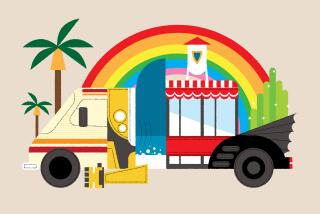China’s Studio City, a Hollywood-themed casino-resort, opens in Macau

- Share via
Reporting from MACAU, China — Here’s what was happening in Studio City on Tuesday night: Martin Scorsese, Leonardo DiCaprio, Robert De Niro and Brett Ratner were walking the red carpet to promote their new film.
A stone’s throw away, workers prepared to open the doors to a new Batman 4-D flight ride and a Warner Bros. indoor play area for kids. Next door, a Hollywood magician debuted a $40-million house of illusions, shoppers strolled under the marquees of the Egyptian Theatre and the American Cinematheque, and Mariah Carey belted her lungs out in a 5,000-seat arena.
All of this activity was contained in a massive new Art Deco-style complex master-planned by a guy in North Hollywood.
But this was not L.A.’s Studio City — this was China’s Studio City, a new $3.2-billion Hollywood-themed casino-resort in the gambling hub of Macau.
It’s the splashiest development to open in the Las Vegas of the East in years, and Studio City’s operators are betting big that Tinseltown can help them bounce back from a precipitous drop in gambling revenue affecting the entire territory.
SIGN UP for the free California Inc. business newsletter >>
Gross gambling revenue in Macau skyrocketed from $5 billion in 2004 to $45 billion in 2013 as the former Portuguese territory opened up its gambling monopoly and allowed operators such as Wynn and Sands to develop properties alongside new local players.
But a corruption crackdown by mainland Chinese authorities, a slowdown in the mainland Chinese economy, caps on the number of gambling tables and other factors slammed the brakes on Macau’s go-go growth starting in mid-2014, and the share prices of casino operators have been hammered.
Analysts at brokerage CLSA expect wagers in Macau to fall to $30 billion this year, warning in a recent report that “the glory days are over.” But the firm expects gross gambling revenue to start growing again by the second quarter of next year. Macau’s gross gambling revenue remains about five times greater than that in Las Vegas.
Studio City is seen as the first test of whether a government-backed push to add more non-gambling elements into Macau’s casino resorts can draw more families and “mass market” gamblers, replacing the high-rolling VIPs who have evaporated in the last year.
In Macau, up to 90% of casino-resort revenue has been coming from gambling; in Las Vegas, non-gambling activities account for about 60% of revenue.
“Studio City is the first of a new generation of properties,” said Marcus Liu, a research analyst at CLSA. “They will have more non-gaming in that property than we’ve ever seen before. Macau has been pressuring operators to build all these non-gaming activities; they’re saying, ‘If you don’t invest in non-gaming, we’re not going to give you the tables.’”
Macau has sought to cap the growth of gambling tables at 3% a year, and competition for the allocations has been stiff. Studio City was awarded 200 tables for its opening, and an additional 50 will come online in early 2016. Still, that’s at least 150 fewer than majority owner Melco Crown Entertainment had sought. Melco is a joint venture run by two casino moguls, Macau’s Lawrence Ho and Australia’s James Packer.
In a sign of the kind of customers Melco expects to draw, none of the tables at Studio City will be for VIP wagers.
Profit margins on VIP players are quite thin, about 10%, while lower-stakes or mass-market players typically generate margins of 30% to 40%. But casino operators will need to lure many more mass-market players to make up for the high-rollers.
That’s where Hollywood comes in. Warner Bros. is a key partner: Melco signed a deal with the studio for a Batman simulation ride, the first of its kind anywhere, as well as a Fun Zone geared to younger kids.
Batman Dark Flight is a 15-minute virtual flight through Gotham City, similar to Soarin’ Over California at Disney’s California Adventure. Guests ride in the Batplane but are menaced by the Joker, who has stolen one of the prototypes of Wayne Industries’ new plane. The admission fee is about $19.
The Fun Zone is a 40,000-square-foot indoor play area with rides for kids under 12 and with characters such as Tom and Jerry, members of the Justice League and Looney Tunes stalwarts Tweety and Sylvester. The facility, which costs $25 for two hours for one adult and one child, also has a playground and space for birthday parties. A small Batman cake from the in-house bakery will set parents back about $50.
SIGN UP for the free Great Reads newsletter >>
With rivals Universal Studios and Disney already in progress on China theme parks, the partnership with Melco gives Warner Bros. a fresh platform to reach the Chinese market.
“We are constantly exploring opportunities. China is a big initiative,” said Karen McTier, executive vice president of Warner Bros. consumer products. Ho said he would “love to see” whether there are further opportunities to expand cooperation with Warner Bros.
Such alliances are opening up new fronts of business for Los Angeles companies such as Thinkwell Group, which has designed attractions for theme parks, museums and other facilities around the globe. The company has done multiple projects with Warner Bros. and was commissioned to develop the Fun Zone.
“Macau wants to build up like Vegas — there’s so much entertainment coming there now, so much,” said Kelly Ryner, president of Thinkwell Asia, the company’s Beijing outpost established last year. Asia, she said, represents about 50% of the firm’s business.
The Beijing office already has 22 employees, with plans to ramp up to 50 by the end of this year, Ryner said. In addition to the Warner Bros. project in Macau, the firm has been designing a Chinese theme park around the legend of the Monkey King. Thinkwell also recently completed two indoor theme-park projects in the northeastern Chinese city of Harbin.
Though some clients are asking Thinkwell to help them create their own characters and themes, she said, “we still have a lot of clients that want to work with existing Western intellectual property.”
The master planning and exterior concept design for Studio City was done by the Goddard Group in North Hollywood. The twin-tower, Art Deco-themed property with 1,600 hotel rooms is intended to have an “epic motion picture feel” that calls to mind films like “Batman” or “Ben Hur,” said company founder Gary Goddard, noting that China accounts for 55% to 60% of his business.
Cinematic elements pervade the Studio City design — built into the center of the facade is a figure-eight Ferris wheel called the Golden Reel.
The resort has three distinct shopping galleries, two with L.A. flavor. One has marquees and facades echoing Hollywood Boulevard’s iconic theaters — think the Egyptian, the Chinese and the El Capitan. The other is supposed to evoke Beverly Hills. A third shopping zone is based on New York’s Times Square.
Ho said his company likes to work with a variety of architects and wants to “be different each time.”
“We don’t like to cookie-cut things. This time we knew we wanted something over the top,” Ho said. “We said, ‘Let’s work with someone who knows the movie business a little bit and has these conceptual ideas.’”
As the resort opened Tuesday, Melco rolled out the red carpet for Hollywood royalty. To promote its opening, the company commissioned a 15-minute film by Martin Scorsese called “The Audition” and showcased it during the grand opening program.
One of the locations in the movie is the Studio City casino, although the movie was filmed in New York, with some digital assistance.
The self-referential comedy stars DiCaprio and De Niro playing themselves, vying for the same role in a movie directed by Scorsese. Brad Pitt also has a role in the piece, which was produced by RatPac Entertainment — a partnership between Hollywood director-producer Ratner and Packer of Melco Crown.
Packer said he believes that the movie and casino businesses make natural allies.
“The casino business and movie business are more similar than people realize,” he said. “People come here because it makes them feel good.... And people pay for that.”
MORE:
An American magician takes his tricks to China
Did a Chinese casino really just pay $70 million for a 15-minute Martin Scorsese film?
Why all the fuss in the South China Sea?







